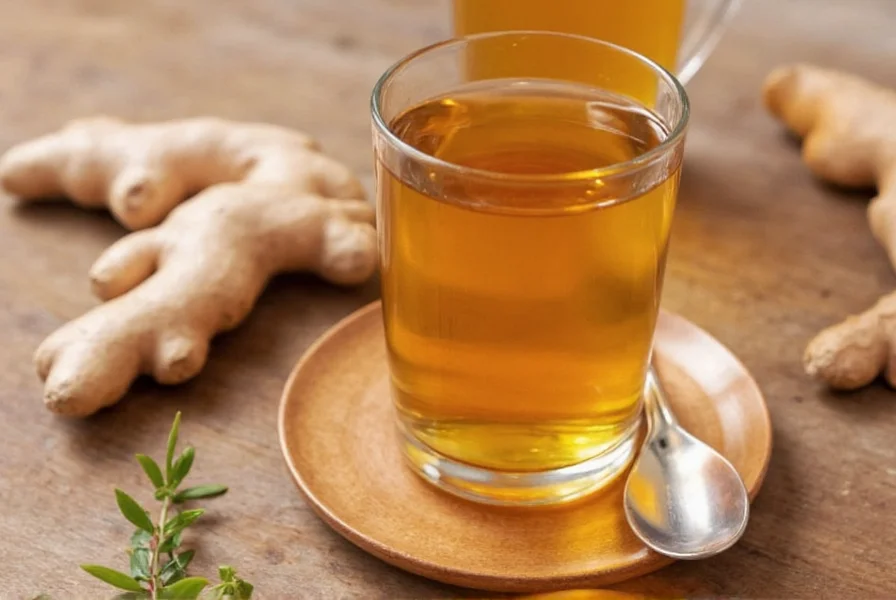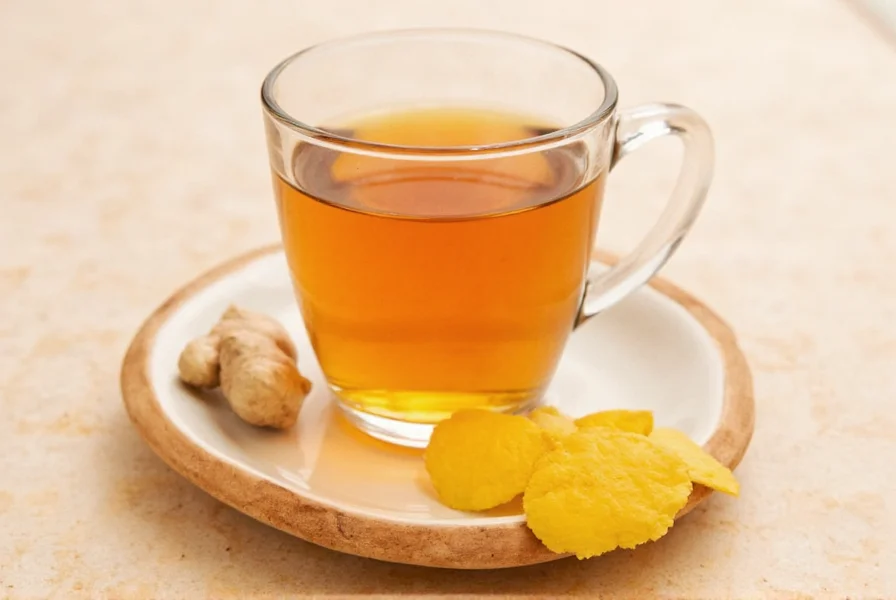Ginger tea has been used for centuries across Asian and Middle Eastern cultures as a natural remedy. Modern research now validates many traditional uses, revealing how this simple beverage delivers measurable health advantages. Unlike many herbal remedies with limited scientific backing, ginger tea benefits are increasingly supported by clinical studies examining its bioactive compounds and physiological effects.
Science-Backed Health Benefits of Ginger Tea
Multiple studies confirm ginger tea's effectiveness for specific health concerns. The National Center for Complementary and Integrative Health recognizes ginger as one of the better-studied herbal products, particularly for digestive issues and nausea relief.
Digestive Health Improvement
Ginger tea stimulates saliva, bile, and gastric enzyme production, accelerating gastric emptying. A 2020 review in Nutrients found ginger significantly reduced symptoms of functional dyspepsia. Participants drinking ginger tea before meals experienced 25% faster stomach emptying compared to placebo, reducing bloating and discomfort.
Nausea and Motion Sickness Relief
Ginger tea shows remarkable effectiveness against various forms of nausea. Research published in Obstetrics & Gynecology demonstrated that 1 gram of ginger daily reduced pregnancy-related nausea by 60%. Similarly, studies on chemotherapy patients found ginger supplementation decreased nausea severity by 40% when combined with standard anti-nausea medications.
| Health Benefit | Scientific Support Level | Recommended Daily Amount |
|---|---|---|
| Digestive support | Strong (multiple RCTs) | 1-2 cups (1-1.5g ginger) |
| Nausea reduction | Strong (systematic reviews) | 1g ginger before triggers |
| Inflammation reduction | Moderate (observational) | 2 cups daily for chronic issues |
| Immune support | Preliminary (in vitro) | Regular consumption |
Anti-Inflammatory Properties
Ginger's gingerols and shogaols inhibit inflammatory pathways similar to NSAIDs but without the gastrointestinal side effects. A 2019 study in Journal of Medicinal Food showed that regular ginger tea consumption reduced markers of inflammation (CRP and IL-6) by 15-20% in osteoarthritis patients after 12 weeks. This makes ginger tea benefits particularly valuable for managing chronic inflammatory conditions.
Immune System Support
While not a cure-all, ginger tea provides compounds that enhance immune response. Research indicates gingerols stimulate immune cell activity and possess antiviral properties against certain respiratory viruses. The warming effect of ginger tea also helps maintain healthy mucous membranes in the respiratory tract, creating a physical barrier against pathogens.
How Ginger Tea Works: The Science Explained
Ginger contains over 400 different compounds, but gingerols are primarily responsible for its therapeutic effects. When you prepare ginger tea, hot water extracts these compounds, making them bioavailable. Fresh ginger contains gingerols, which transform into shogaols when dried or heated—both compounds offer distinct health advantages.
The concentration of active compounds depends on preparation method. Studies show that grating fresh ginger and steeping for 10 minutes releases approximately 30% more gingerols than using pre-packaged tea bags. For maximum benefits of drinking ginger tea, use 1-2 inches of fresh ginger root per cup of water.
Practical Usage Guide
Optimal Preparation Method
To maximize ginger tea benefits:
- Peel and grate 1-2 inches of fresh ginger root
- Boil in 8-12 ounces of water for 10 minutes
- Strain and add lemon or honey if desired
- Consume while warm for best absorption
For digestive benefits, drink ginger tea 20 minutes before meals. For nausea relief, consume at the first sign of symptoms. Regular consumption throughout the day provides cumulative anti-inflammatory effects.

Daily Consumption Guidelines
Most clinical studies showing ginger tea benefits used doses equivalent to 1-3 grams of ginger daily, translating to 1-3 cups of properly prepared tea. Exceeding 4 grams daily may cause gastrointestinal discomfort in sensitive individuals. Pregnant women should limit consumption to 1 gram daily (about 1 cup) after consulting their healthcare provider.
Safety Considerations and Potential Side Effects
Ginger tea is generally safe for most adults when consumed in moderation. However, certain populations should exercise caution:
- Blood thinning effects: Ginger may enhance blood-thinning medications like warfarin. Consult your doctor if taking anticoagulants.
- Diabetes management: Ginger can lower blood sugar. Those on diabetes medication should monitor levels closely.
- Gallstone concerns: Ginger stimulates bile production, which may cause discomfort for those with gallstones.
- Pregnancy: While effective for morning sickness, excessive consumption late in pregnancy may increase bleeding risk.
Reported side effects of ginger tea are typically mild and include heartburn, mouth irritation, or diarrhea when consumed in excess. If you experience any adverse reactions, discontinue use and consult a healthcare professional.

Ginger Tea vs. Other Ginger Forms
While ginger supplements and fresh ginger offer similar benefits, ginger tea provides unique advantages:
- Bioavailability: The hot water extraction process makes ginger compounds more readily absorbed than raw ginger
- Gentler on stomach: Tea preparation reduces the intensity that sometimes causes discomfort with raw ginger consumption
- Hydration benefit: Provides fluid intake along with therapeutic compounds
- Lower risk of overconsumption: Naturally limits intake compared to concentrated supplements
For those seeking ginger tea benefits for specific conditions, consult with a healthcare provider to determine whether tea, supplements, or fresh ginger best suits your needs.
Conclusion
Ginger tea offers evidence-supported health advantages that extend beyond traditional folklore. Its effectiveness for digestive issues, nausea relief, and inflammation reduction makes it a valuable addition to a healthy lifestyle. When prepared properly and consumed in appropriate amounts, ginger tea provides a safe, natural approach to managing several common health concerns. Remember that while ginger tea benefits are significant, it works best as part of a comprehensive approach to wellness rather than a standalone cure.
Frequently Asked Questions
How much ginger tea should I drink daily for health benefits?
For general health benefits, 1-2 cups of properly prepared ginger tea daily provides optimal results. Each cup should contain 1-1.5 grams of fresh ginger (about 1 inch of root). Clinical studies show this amount delivers sufficient active compounds without risk of side effects for most adults. Exceeding 4 grams of ginger daily may cause digestive discomfort.
Can ginger tea help with weight loss?
While ginger tea isn't a weight loss solution, research suggests it may support metabolic health. A 2019 study found ginger supplementation increased thermogenesis and reduced feelings of hunger. When combined with a healthy diet and exercise, ginger tea benefits may include modest support for weight management through improved digestion and reduced inflammation, but it shouldn't be relied upon as a primary weight loss method.
When is the best time to drink ginger tea for maximum benefits?
Timing depends on your specific health goals. For digestive support, drink ginger tea 20 minutes before meals. For nausea relief, consume at the first sign of symptoms. For general anti-inflammatory effects, spreading consumption throughout the day provides consistent benefits. Many people find morning consumption supports metabolism, while evening consumption may interfere with sleep for sensitive individuals due to ginger's mild stimulating effect.
Does ginger tea interact with medications?
Yes, ginger tea may interact with certain medications. It can enhance the effects of blood thinners like warfarin, potentially increasing bleeding risk. Ginger may also lower blood sugar, which could amplify the effects of diabetes medications. If you take medications for high blood pressure, consult your doctor as ginger may enhance their effects. Always discuss ginger tea consumption with your healthcare provider if you're taking prescription medications.
Is store-bought ginger tea as effective as homemade?
Homemade ginger tea typically delivers more potent benefits than store-bought versions. Commercial tea bags often contain lower ginger concentrations and may include fillers. Studies measuring gingerol content show homemade tea from fresh ginger contains 30-50% more active compounds than most commercial products. For maximum health benefits of drinking ginger tea, prepare it fresh using organic ginger root. If using commercial products, choose those listing ginger as the first ingredient without added flavors or preservatives.











 浙公网安备
33010002000092号
浙公网安备
33010002000092号 浙B2-20120091-4
浙B2-20120091-4